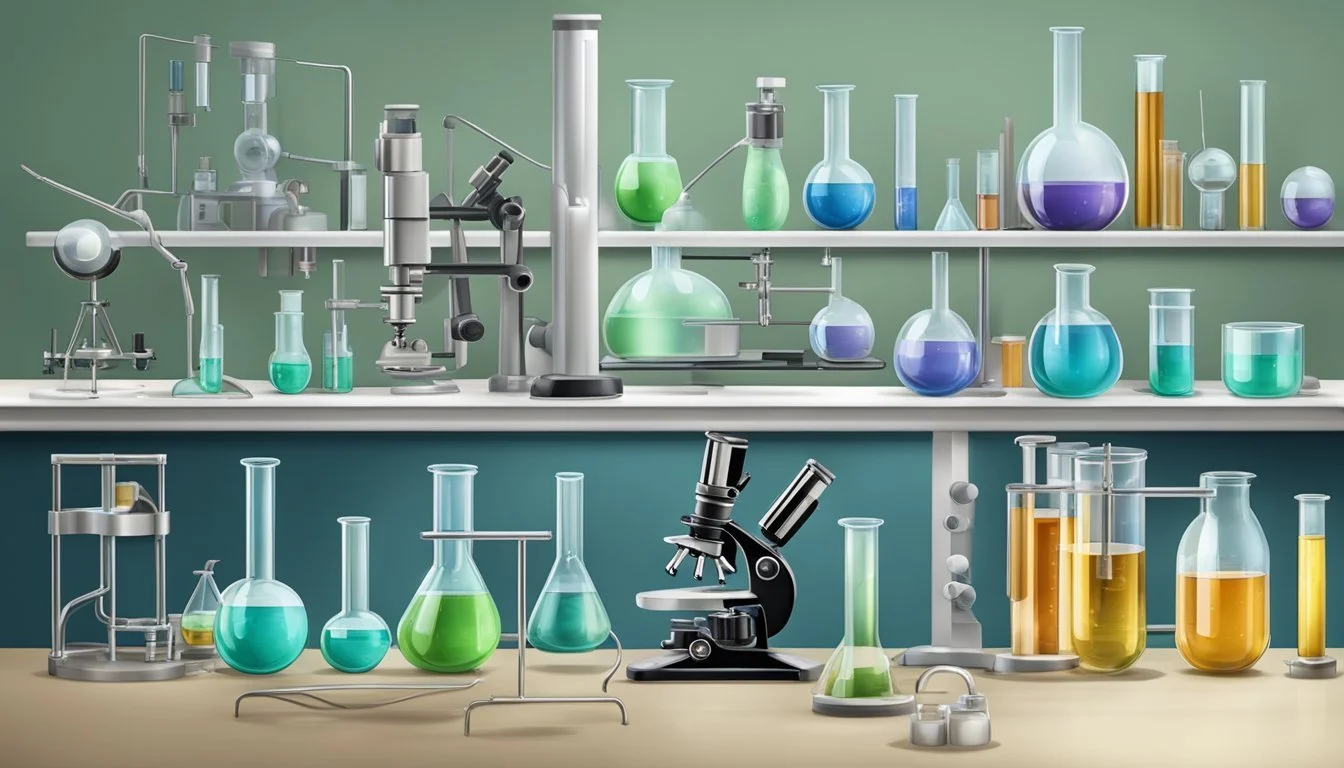Exploring the Power of Mind and Body in Overcoming Illness
Exploring the Power of Alternative Medicine
The documentary "Heal" explores the powerful connection between mind and body in the healing process. Directed by Kelly Noonan Gores, this 2017 film takes viewers on a scientific and spiritual journey to uncover how thoughts, beliefs, and emotions impact physical health. The documentary suggests that individuals have more control over their wellbeing than traditionally believed, proposing that changing one's perceptions can potentially heal the body from various ailments.
"Heal" features interviews with experts like Deepak Chopra, Marianne Williamson, and Dr. Bruce Lipton, who share insights on alternative approaches to healing. The film follows several individuals as they attempt to recover from serious illnesses using mind-body interventions. While some viewers find the documentary inspirational, critics have raised concerns about its promotion of ideas that may not align with established medical science.
Origins and Evolution of Healing Documentaries
Healing documentaries emerged as a distinct genre in the late 20th century. These films explore alternative approaches to health and wellness, often blending scientific research with spiritual perspectives.
One of the pioneering works in this field was "The Connection" (1988), which examined the mind-body relationship in healing. It paved the way for future documentaries that delved deeper into holistic health concepts.
The 1990s saw an increase in films focusing on specific healing modalities. "Ayurveda: The Art of Being" (1995) introduced Western audiences to traditional Indian medicine.
In the 2000s, documentaries like "The Living Matrix" (2009) began incorporating quantum physics and energy medicine theories. These films aimed to bridge the gap between conventional science and alternative healing practices.
Recent years have seen a surge in healing documentaries reaching mainstream audiences. "Heal" (2017) featured prominent figures in the field, exploring how changing perceptions can impact physical health.
Today, healing documentaries continue to evolve. They often include:
Expert interviews
Personal transformation stories
Scientific explanations
Practical techniques for viewers
As interest in holistic health grows, these films play a crucial role in educating and inspiring audiences about diverse healing approaches.
Conceptual Framework
The documentary "Heal" explores the interplay between scientific understanding and spiritual beliefs in the realm of health and healing. It examines how thoughts, emotions, and beliefs can influence the human body's ability to recover from illness.
Interplay of Science and Spirituality
"Heal" presents a conceptual framework that bridges scientific research with spiritual practices. The film features insights from medical professionals and spiritual leaders, highlighting how these seemingly disparate fields can complement each other in promoting healing. It showcases studies on the placebo effect, demonstrating how positive beliefs can trigger physical improvements in the body.
The documentary also explores how meditation and mindfulness practices, rooted in spiritual traditions, can lead to measurable changes in brain activity and stress hormone levels. This approach suggests that integrating scientific knowledge with spiritual wisdom may offer a more comprehensive understanding of the healing process.
The Mind-Body Connection
Central to the film's framework is the concept of the mind-body connection. "Heal" examines how thoughts and emotions can influence physical health through various biological mechanisms. It delves into the field of psychoneuroimmunology, which studies the interactions between psychological processes and the nervous and immune systems.
The documentary presents evidence of how chronic stress can suppress immune function and potentially contribute to disease. Conversely, it explores how positive emotions and a sense of purpose can enhance overall well-being. The film also touches on epigenetics, suggesting that our thoughts and experiences may influence gene expression, potentially affecting our health outcomes.
Key Figures in 'Heal'
The documentary 'Heal' features several influential figures who offer unique perspectives on mind-body healing. These experts share insights from their personal experiences and professional knowledge.
Dr. Deepak Chopra's Contribution
Dr. Deepak Chopra, a prominent figure in alternative medicine, plays a significant role in 'Heal'. He emphasizes the connection between mind and body in the healing process. Chopra discusses the concept of consciousness and its impact on physical health.
He introduces viewers to meditation techniques and stress reduction methods. These practices, according to Chopra, can positively influence the body's ability to heal itself. His approach combines ancient wisdom with modern scientific understanding.
Chopra also addresses the placebo effect and its implications for healing. He suggests that belief and expectation play crucial roles in recovery from illness.
Influences of Anita Moorjani
Anita Moorjani brings a powerful personal story to 'Heal'. She shares her experience of a near-death encounter while battling cancer. Moorjani's account offers a unique perspective on the mind's role in healing.
She describes how her outlook on life changed after her near-death experience. This shift in consciousness, she claims, contributed to her rapid recovery from late-stage cancer. Moorjani emphasizes the importance of self-love and releasing fear in the healing process.
Her story challenges conventional medical understanding. It suggests that emotional and spiritual factors can significantly impact physical health outcomes.
Marianne Williamson's Perspectives
Marianne Williamson contributes spiritual insights to the documentary. She discusses the role of love and forgiveness in healing. Williamson emphasizes the power of positive thinking and its effects on health.
She explores the concept of spiritual healing and its potential to complement traditional medical treatments. Williamson addresses the mind-body connection from a spiritual standpoint. She suggests that emotional and spiritual well-being can influence physical health.
Williamson also touches on the idea of collective healing. She proposes that societal attitudes towards health and illness can impact individual healing journeys.
Healing as a Personal Journey
The documentary "Heal" showcases individuals on transformative healing journeys. These stories highlight the power of mindset and holistic approaches in overcoming health challenges.
The Role of Emotional Stories
"Heal" features compelling accounts of people facing serious health issues. These narratives demonstrate the emotional aspects of healing processes. Viewers witness the struggles and triumphs of individuals as they confront their diagnoses.
The film emphasizes how changing perspectives can impact physical well-being. It presents cases where people challenged their prognoses through alternative methods. These emotional stories serve as powerful examples of resilience and hope.
Cases of Extraordinary Healing
The documentary explores instances of remarkable recoveries. It presents situations where individuals defied medical expectations. These cases often involve integrative approaches to health and wellness.
"Heal" examines how some people overcame chronic illnesses through non-traditional means. It showcases the work of practitioners who combine conventional and alternative therapies. The film suggests that extraordinary healing can occur when patients take an active role in their recovery.
These examples challenge viewers to consider the mind-body connection in health. They illustrate the potential for unexpected positive outcomes in difficult medical situations.
The Scientific Perspective
The documentary "Heal" explores how the human body's natural healing abilities are influenced by thoughts, beliefs, and emotions. Scientific research provides insights into the intricate connections between mind and body, shedding light on the potential for self-healing.
Role of Scientists and Research
Scientists play a crucial role in uncovering the links between mental states and physical health. Studies have shown that stress reduction techniques like meditation can positively impact immune function and overall well-being. Researchers use advanced imaging technologies to observe brain activity during healing processes.
Neuroscientists have identified specific brain regions activated during placebo responses, demonstrating the power of belief in triggering physiological changes. Epigenetic research reveals how environmental factors and lifestyle choices can influence gene expression, potentially impacting health outcomes.
Understanding the Human Body
The human body possesses remarkable self-healing capabilities. Cells continuously regenerate, and the immune system works tirelessly to defend against pathogens. The body's innate wisdom allows for homeostasis, maintaining balance despite external challenges.
Recent discoveries highlight the importance of the gut-brain axis in overall health. The microbiome's influence on immune function and mental well-being underscores the interconnectedness of bodily systems. Scientists continue to unravel the complexities of pain perception and how mental states can modulate physical sensations.
Advances in neuroplasticity research demonstrate the brain's ability to form new neural connections throughout life, suggesting potential for healing and adaptation even in adulthood.
The Spiritual Dimension
The spiritual dimension of healing explores the connection between mind, body, and spirit. It emphasizes the role of thoughts, beliefs, and emotions in physical health and well-being.
Insights from Spiritual Teachers
Deepak Chopra, a prominent figure in the mind-body medicine field, advocates for integrating spiritual practices into healing. He emphasizes the power of meditation and positive thinking in promoting wellness.
Gregg Braden, known for bridging science and spirituality, discusses how belief systems influence physical health. His work explores ancient healing techniques and their relevance in modern medicine.
Marianne Williamson, a spiritual teacher and author, focuses on the healing power of love and forgiveness. She believes in addressing emotional and spiritual issues to facilitate physical healing.
Exploring the Spiritual Journey
The spiritual journey in healing often involves self-reflection and personal growth. Many individuals report profound transformations through practices like meditation, prayer, and energy work.
Some explore alternative healing modalities such as Reiki, acupuncture, or sound therapy. These approaches aim to balance the body's energy systems and promote holistic well-being.
Spiritual healing may also involve connecting with nature, practicing mindfulness, or engaging in creative activities. These practices help individuals find meaning and purpose, which can positively impact their health.
The medical medium Anthony William promotes the idea of spiritual healing through nutrition and natural remedies. His approach combines intuitive insights with dietary recommendations for various health conditions.
Integrative Healing Approaches
Integrative healing approaches combine conventional medical treatments with complementary therapies to address the whole person. These methods aim to harness the body's natural healing abilities while utilizing modern medical advancements.
Combining Western Medicine and Alternative Methods
Western medicine forms the foundation of integrative healing approaches. Doctors use evidence-based treatments like surgery, chemotherapy, and pharmaceuticals to target specific diseases. Alongside these conventional methods, alternative therapies are incorporated to support overall health and well-being.
Common complementary therapies include:
Acupuncture
Herbal medicine
Nutrition and dietary changes
Mind-body practices (meditation, yoga)
Energy healing techniques
This integrated approach allows patients to benefit from the strengths of both Western and alternative medicine. By addressing physical symptoms as well as emotional and spiritual aspects, integrative healing aims to promote comprehensive wellness and improve treatment outcomes.
The Effectiveness of Beliefs and Emotions
The mind-body connection plays a crucial role in integrative healing approaches. Research suggests that a person's beliefs, thoughts, and emotions can significantly impact their physical health and recovery process.
Positive beliefs and emotions are associated with:
Reduced stress levels
Improved immune function
Better pain management
Enhanced overall well-being
Integrative healers often incorporate techniques to harness the power of the mind, such as visualization exercises, affirmations, and cognitive behavioral therapy. These practices aim to cultivate a positive mindset and emotional state, potentially boosting the effectiveness of medical treatments.
By recognizing the influence of beliefs and emotions on health, integrative approaches seek to create a more holistic healing environment for patients.
Reflecting on 'Dis-ease'
'Dis-ease' offers a thought-provoking exploration of how society perceives and responds to illness. The documentary challenges conventional views on health and healing.
Kelly Noonan, the filmmaker behind 'Heal', tackles similar themes in her work. Both films examine alternative approaches to wellness and recovery.
The power of belief in healing is a central concept. Dr. David Hamilton's research on the placebo effect supports this idea, suggesting thoughts can influence physical health outcomes.
'Dis-ease' investigates how cultural narratives shape our understanding of sickness. It prompts viewers to question established medical paradigms.
The film highlights the complex relationship between mind and body in health. It explores how mental states may impact physical well-being.
Viewers are encouraged to consider holistic approaches to health. The documentary presents perspectives that complement traditional medical treatments.
'Dis-ease' sparks dialogue about personal agency in healing. It suggests individuals may have more control over their health than commonly believed.
The film's release in 2024 reflects growing interest in integrative health approaches. It contributes to ongoing discussions about the future of healthcare.
Conclusion
The documentary "Heal" presents a thought-provoking exploration of alternative approaches to healing and wellness. It examines the potential power of the mind-body connection in addressing various health conditions.
Through interviews with experts and personal stories, the film highlights different perspectives on holistic healing methods. These include Eastern medicine practices and mind-body interventions.
"Heal" raises interesting questions about the role of mental and emotional factors in physical health. It encourages viewers to consider complementary approaches alongside conventional medical treatments.
The documentary's presentation of these ideas has sparked both interest and debate. Some find it inspiring and informative, while others view it as overly promotional of alternative therapies.
Ultimately, "Heal" serves as a starting point for discussions about integrative health approaches. It prompts viewers to reflect on the complex relationships between mind, body, and overall well-being.






